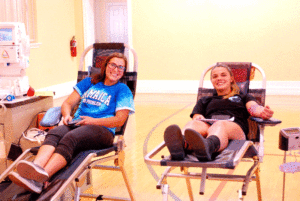By GABRIELLE SHIOZAWA

Many MVHS students have expressed interest in donating blood, but they have also brought up fears and concerns about the process. Here are some explanations in response to common blood donation-related questions.
Why should I donate? What will my blood be used for?
Blood donations aren’t just needed after major tragedies. Blood is needed by 5 million Americans every year for trauma, burns, premature infants, heart surgery, organ transplants, fighting cancer, and numerous other medical issues. Blood saves lives! Donating your blood is an easy way to help others and save lives.
How old do I have to be to donate? How often can I donate?
Whole blood donations can be made every 56 days for those who are 17 years old or older. Blood drives that take place outside of the high school, such as our recent Grant M. Bowler Elementary School blood drive, allow 16-year-olds to donate. Anyone who is under the age of 18 requires a parent permission slip to be able to donate blood.
How can I prepare for donation?
The day before donating, you should eat a high-sodium meal like a hamburger, pizza, or canned soup. Within two hours of donating, you should eat a healthy meal. Being prepared will help keep your blood pressure steady and help you recover faster.
Be hydrated! Drink 8-16 ounces of water and/or juice before donating. Beverages and snacks are often provided at blood drives, but you should also be prepared on your own. Avoid medications like ibuprofen that thin your blood.
What can I do while I donate?
To get your mind off donating, you are welcome to read a book, watch a show on your phone, or listen to music. Bringing a distraction is a good way to get through the process if you are nervous.
Does it hurt to donate blood?
Your finger will have to be pricked in order for the donation specialists to check your iron levels. You will also feel a brief pinch in your arm when the needle goes in. The whole process is a lot less painful than you imagine it to be! Looking away and taking a deep breath also helps.
What do the different blood types mean?
One cool thing about donating blood is learning your blood type! O+ is the most common blood type. O- is the universal type, which means that your red blood cells can be used for anybody! If you have AB+ blood type, you are a universal plasma donor. People with type A blood can donate to anybody with A or AB; those who have type B blood can donate to anyone with B or AB. Doing more research on your blood type can also tell you what kinds of diseases you are the most susceptible to.
How will donating blood affect me?
Donating blood lowers your risk of cancer, helps you maintain a healthy heart and liver, and stimulates blood cell production! So, not only do you get to save lives; you become healthier!
Donating blood can seem scary, but it doesn’t have to be. Our next blood drive will be at MVHS on January 29. Come be a hero!








![ElectionAd [Recovered]2](https://mvprogress.com/wp-content/uploads/2024/05/4-24-2024-FC-ElectionAd-Finalv3.jpg)

